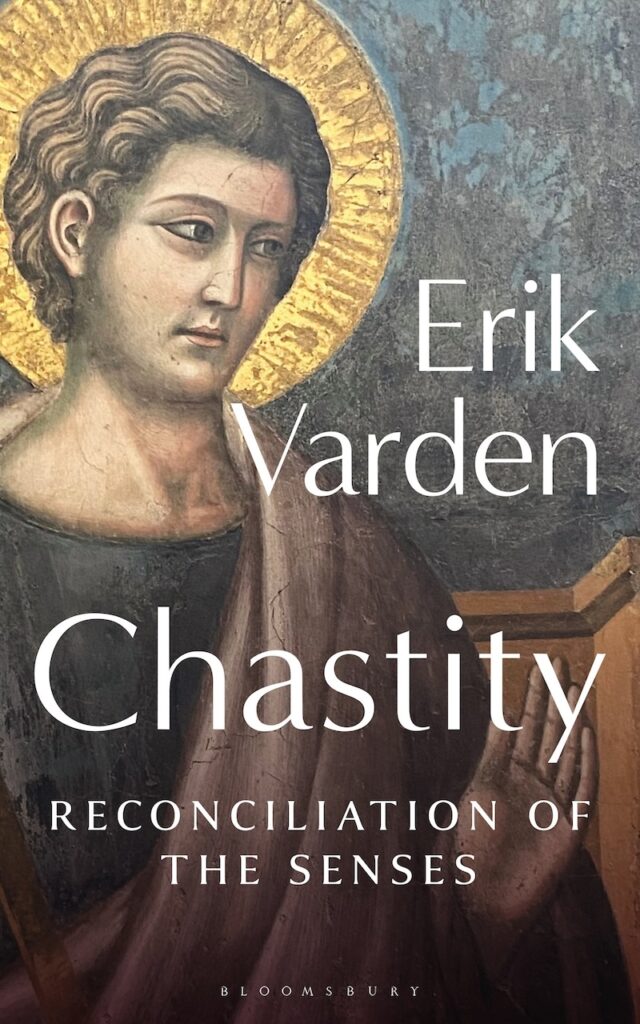“Chastity: Reconciliation of the Senses”
By Erik Varden, O.C.S.O.
Bloomsbury Continuum, 2023
176 pages
The Norwegian bishop and Trappist monk Erik Varden, still shy of 50, has established himself as a spiritual writer, retreat leader and prelate of the highest order. Raised in a non-practicing Lutheran home in a village in Norway, he was a teenage “agnostic” who was “hostile” to Christianity. His conversion to the Catholic faith at age 19 was slow but sure. He studied at Cambridge and Rome and then, in 2002, he entered Mount St. Bernard Abbey, a Trappist monastery near Leicestershire, England. Ordained a priest in 2011, he was named Bishop of Trondheim by Pope Francis in 2020.
Having read Bishop Varden’s three most recent books — “The Shattering of Loneliness: On Christian Remembrance” (2018), “Entering the Twofold Mystery: On Christian Conversion” (2022), and “Chastity: Reconciliation of the Senses” (2023) — I am deeply impressed by the scholarship, clarity and beauty of his thought and writing. His knowledge and love of Scripture and the Fathers of the Church are obvious. He apparently is a polyglot, and he draws upon a remarkable array of examples from literature, music and art.
Most impressive, however, is the deep serenity and the love of Christ that permeates his books. He asks hard questions and engages with difficulties with a winsome honesty and humility, always grounded in a contemplative perspective rooted in prayer and liturgy.
“Chastity,” he writes early on, “is a virtue for all. … Unless chastity has a degree of full-bloodedness, it is not the real thing, but counterfeit.” Chastity is misunderstood badly, and so Bishop Varden spends time delving into the etymology, showing that the “purity” of chastity is not merely a matter of morals, but of a robust and self-aware anthropology. It “is a marker of integrity, of a personality whose parts are assembled in harmonious completeness.”
But chastity is also, and ultimately, eschatological: “To be chaste in this life is to attune oneself to celestial life…” and “the Christian life is life oriented towards beatitude.” This essential theme continues throughout, including in an excellent section on “Order and Disorder.” Prior to the Fall, in the beginning, “man was invited to choose beatitude” but had the freedom to reject it. Man was created with a priestly character, invited to offer himself in love to the Lover of mankind. “His sacerdotal sacrifice,” writes Bishop Varden, “lay in the ordering of his free will according to God’s call.”
This ordering, then, is relational and covenantal; it helps situate sexuality within the drama of salvation in this life. Bishop Varden observes that chastity “is not a denial of sex” but “an orientation of sexuality, of the whole vital instinct, towards a desired finality.”
The book includes sections on what it means to be male and female, Genesis and creation, eros and death and observations on the close relationship between monasticism and marriage (a relationship emphasized more overtly in Eastern Christian spirituality). One of numerous strengths of this book is its insight into sexuality and love. A point made several times in various ways is that love is only true when it is properly ordered; it won’t do to simply appeal, with sentimental glibness, to “love is love” while ignoring the source and fulfillment of our deepest needs and desires.
Bishop Varden offers much specific wisdom here. “The way to order, for most of us,” he writes, “goes through disorder.” To pretend that such disorder does not exist “is to entertain illusion. … How can I ever be healed if I am determined to give the impression that I am not sick?” In order to grow in chastity, we must be willing to “own and name that which is in my heart.”
Reflecting on the grave sins of Kings David and Solomon, Bishop Varden flatly states: “To enthrone lust as the heart’s governor is to surrender to idolatry.” And while, in “a Christian optic, eros is an impulse towards the divine” it is “not itself divine” and “must not be mistaken for the goal.”
The key, of course, is found in Jesus Christ, the new Adam, who alone can restore man to his original image: “Only in the light of our human substance’s longing for union with the divine do our lesser yearnings make sense. Only the eternal Logos will order these yearnings well and draw them out of chaos into kosmos.”
Rich with wisdom and deeply challenging, “Chastity” is a book for everyone, a relatively short but robust reflection on essential truths, rendered with serenity and hope.

